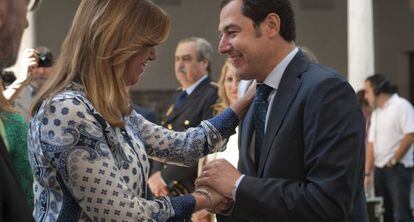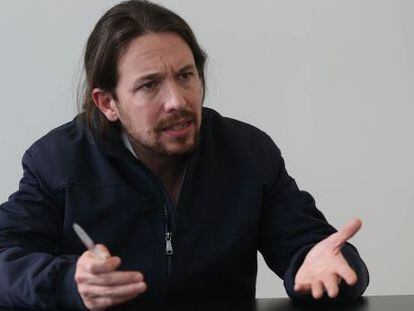Andalusia premier calls early elections after Socialist-IU coalition falls apart
A PSOE victory on March 22 would help galvanize party against Podemos challenge

Andalusia’s premier Susana Díaz on Sunday announced early regional elections for March after deciding that the nearly three-year-old governing pact between her Socialist Party and the United Left (IU) coalition was unsustainable.
Díaz set the election date for March 22 after failing to patch up her differences with Andalusia IU leader Antonio Maíllo.
The call for the early vote means Andalusia will become the first regional measure of the strength of the Socialists (PSOE) and the national ruling Popular Party (PP) – the two forces that have led the Spanish political scene in recent decades – as they face the growing challenge represented by the rise of new anti-austerity party Podemos.
Relations between Díaz and Maíllo have never been smooth. On Friday, they held a meeting to discuss a range of rocky issues, including the IU’s plans to organize a referendum among its members this summer on whether to leave the coalition with the Socialists if Díaz’s government failed to push a series of reforms through parliament, including introducing minimum payments to cover basic utilities for all Andalusians.
One of the rocky issues centers on a planned referendum to decide the IU’s future with the Socialists
The elections in March will also serve as a bellwether for the IU’s up-and-coming national leader Alberto Garzón, who could become the group’s candidate in the general elections. In recent months, Garzón has been edging toward some of Podemos’s social policies, while distancing himself from the Socialists, the IU’s traditional political partner over the past decade.
After communicating her decision to Maíllo, Díaz telephoned Socialist secretary general Pedro Sánchez, who offered his support in the regional campaign.
Governed by the PSOE for more than 25 years, Andalusia has long been a Socialist stronghold. But the party’s reputation has been severely weakened over the years by a series of arrests of past officials, and charges filed at the Supreme Court against Díaz’s two predecessors, Manuel Chaves (1990-2009) and José Antonio Griñán (2009-2013), in connection to a fraud scheme that siphoned money from public funds set aside to help ailing businesses pay severance to laid-off workers.
In making her decision to call early elections, Díaz also weighed in the Podemos factor. Even though Podemos has made headway in many provinces across Spain, its structure in Andalusia is not well organized. Its leader Teresa Rodríguez, who comes from the Anti-Capitalist Left group, is part of an internal sector that has been critical of Podemos leader Pablo Iglesias.
Díaz also took into consideration Podemos’s showing in Andalusian opinion polls, which is not as high as in other parts of the country. Voter intention surveys place Podemos in third place behind the Socialists and PP. The regional premier wants to help galvanize the PSOE, which will faces a tough general election in November, by showing the Socialists’ strong standing in Andalusia.
Early this month in an EL PAÍS interview, Iglesias predicted that the race would come down to only two political forces: Podemos and the PP. The Socialists would end up on the second tier of Spain’s political scene, he said,
But, according to Andalusian Socialist leaders, a PSOE victory in March would give a much-needed boost to the national party.











































